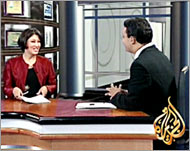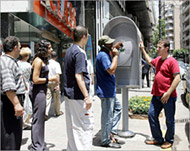Poll reveals Arabs’ true feelings on US
In yet another blow to the Bush administration’s efforts to counter anti-American sentiments in the Middle East, a new poll shows rising bitterness in the region toward US foreign policy.

The poll, Impressions of America, was commissioned by the Arab American Institute (AAI) and conducted in June by Zogby International. It surveyed nearly 3300 Arab citizens in Morocco, Saudi Arabia, Jordan, Lebanon, the United Arab Emirates (UAE) and Egypt.
The number of Arabs with a favourable opinion of the United States dropped significantly in every country except for the UAE, compared with a similar poll taken in 2002.
In Egypt alone, 98% of those surveyed expressed a negative view of the US, a 22% increase from two years ago. The favourability rating was highest in Lebanon, where 20% said they had a positive view of the US and nearly 70% said otherwise.
AAI president James Zogby said US policies on Iraq and the Israeli-Palestinian conflict were primarily responsible for the heightened animosity. The vast majority of Arabs surveyed in all six countries said they had an unfavourable view of American policy on both issues.
“There is an anger and a frustration and even an alienation from America” that is driving Arab public opinion, Zogby said.
Detestable war
When asked why they did not like the US, many Arabs polled said it was because of how the American government treated “Arabs and how you are killing Arabs,” Zogby said.
 |
|
Bush’s War on Terror is key in |
The growing perception in the Arab world that the US has targeted Arabs and Muslims in Bush’s War on Terrorism has become a “third issue in shaping attitudes toward the United States”, he said.
“That almost equals and, in some cases, surpasses [US] policies on the Palestinians and Iraq,” he said.
Despite their dislike of US foreign policy, the poll showed many Arabs still admire American values and products, Zogby said, contradicting the theory that “they hate us because of our values”.
“Arabs and Muslims liked many qualities and features of America,” he said. “But they detested our policies.”
Technology triumphs
In Jordan, a country where 78% of Arabs expressed an unfavourable opinion of the US overall, 83% said they liked American science and technology and nearly 60% had a favourable view of US democracy and education.
Such attitudes toward American values are, in part, influenced by information sources, according to the poll, which found that most Arabs derive their primary source of knowledge about the US from the Arab media.
Arabs who had either visited the US or learned about it by watching American television had more favourable views toward American values. Such factors did not, however, influence Arab opinions on US policy, Zogby said.
The AAI findings were released in conjunction with a second poll conducted by the Anwar Sadat chair for peace and development at the University of Maryland, which surveyed Arab attitudes on the media, as well as various political and social issues.
TV nations
The May 2004 poll, conducted in Jordan, Lebanon, Morocco, Saudi Arabia and the UAE, documented the growing phenomenon of Arab satellite television and its impact on public opinion.
 |
|
Aljazeera was the most watched |
In all five countries surveyed, Aljazeera was the most watched satellite channel for international news, followed by al-Arabia.
Professor Shibley Telhami, head of the Anwar Sadat chair, said while the findings suggested Arab satellite stations were having an “impact on Arab identity”, they were not driving attitudes on policy.
“It is clear that on the opinion side the media has only a marginal impact,” Telhami said. “The media is reflecting public opinion.”
Reinforced values
Many Arabs, he said, gravitate toward news outlets that reflect their pre-existing viewpoints, which are unlikely to change by watching one station more than another.
“In America itself, if the issue is one you care about most deeply, then the media affects you less,” he said, adding that it would be a “huge mistake” to assume that Aljazeera or any other Arab station is “driving anti-Americanism”.
While many Arabs follow American news channels such as NBC and al-Hurra, the US government-sponsored Arabic satellite station, they simply don’t watch them as frequently as the top pan-Arab stations, he said.
Further findings
The Maryland poll expanded on some of the findings in the AAI survey, showing that most respondents distrust US motives in Iraq, a war many feel created more violence toward the US and less democracy in the region.
 |
|
The Lebanese were the exception |
There is also an emerging sense of Islamic identity in the Arab world, according to the poll. When asked to define their primary identity, more respondents in Jordan, Morocco, Saudi Arabia and the United Arab Emirates identified themselves as Muslims, as opposed to citizens or Arabs. Lebanon was the exception, where 77% polled described themselves mainly as Lebanese citizens.
Telhami attributed the trend to the perception shared by many Arabs that US foreign policy “is against Muslims”.
The two most admired world leaders in the poll were French President Jacques Chirac and the late Egyptian President Gamal Abd al-Nasir. In Jordan, 21% of the respondents said they admired former Iraqi President Saddam Hussein more than any leader outside of that country, while 18% of Arabs in the United Arab Emirates cited Usama bin Ladin as the world leader they respected most.
Telhami said such answers were likely an act of defiance toward the US.